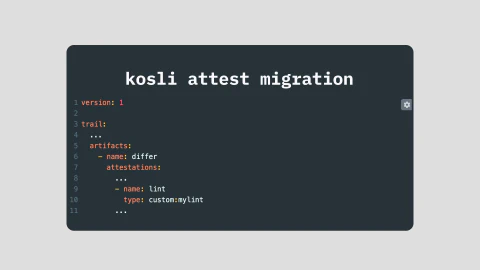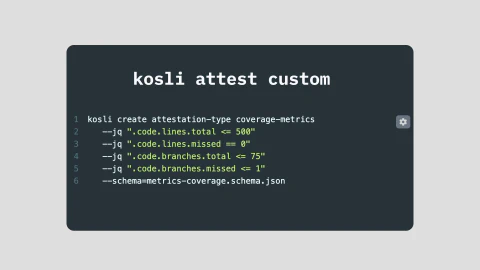DevOps teams play an increasingly important role in all types of software companies. From legacy organizations to cloud-native startups, the DORA metrics tell us that the performance of the DevOps team correlates very closely with the overall success of the business.
But, as DevOps starts to be adopted across highly regulated industries, we no longer live in a world where it’s ok to “move fast and break things.” For banks, healthcare companies, car manufacturers, etc., maintaining security and compliance is every bit as important as shipping new features to market in the shortest possible time.
In this post, we will talk about how you can maintain security with DevOps compliance and how both security monitoring and compliance software come into play.
What is DevOps Compliance?
DevOps compliance is about aligning all of the automation in your software delivery process with governance tasks like audit and security. It’s about proving that your team follows strictly defined practices for developing, testing, and deploying code to cloud infrastructure.
This proof is needed to pass cybersecurity audits, to receive and maintain security certifications, and to build trust with consumers. In certain industries like those under the auspices of the FDA, this proof is a prerequisite to operate in the market. Even in non-regulated industries, companies may opt-in to certain standards so that they can win the trust of customers. Examples here include ISO 27001, FedRAMP, or SOC 2.
DevOps security compliance software, therefore, typically focuses on tracking all the changes to your applications and infrastructure so you can prove that your team is compliant with the policies you claim to follow.
Why DevOps Compliance Matters for Security
We want to acknowledge that DevOps compliance does not automatically equal absolutely bomb-proof, unbreachable security. You can comply with your business’s baseline policies, only to find they might not protect you from every threat out there.
That said, if you’re conducting regular compliance audits for certifications like those mentioned above, you probably have a reasonable foundation on which to build a very strong cybersecurity posture.
DevOps compliance can help you ensure that you’re also maintaining robust security practices. It can also help you ensure you’re meeting requirements set forth by any federal, industry, or legal regulations. For this reason alone, ongoing compliance is essential, affording an additional layer of protection for your business.
Speed vs. Security Processes: The Catch-22 of DevOps Compliance
The reality is that DevOps teams are locked in an internal conflict between speed and security. There’s constant market pressure to go at a lightning-fast pace with new feature deployments while also adhering to red tape on compliance and security.
The reality is that audits and compliance, when done traditionally, are tedious manual processes that can slow everything down, and documenting changes needed to pass those audits is particularly draining— especially when the team is focused on deploying changes to keep up with business demands, and are sometimes rolling out hundreds of updates per week (or even per day).
As a result, depending on the age of the businesses, it usually ends up trapped in one of the following two situations if they don’t have a streamlined security compliance program:
- New cloud-native companies use lots of automation, which works for deployments, but then hit a wall when they run into audits and need to figure out how to provide evidence for all of those rapid-fire changes.
- Old companies with legacy change management processes want to embrace automation but struggle to accelerate to the kind of deployment speed they want when they’re held back with manual change processes.
The good news is that with the right processes and the right security compliance software, this particular Catch-22 doesn’t have to impact your business any longer. Leading software companies like Amazon and AirBnB are able to deploy over 125k changes every day because they bake compliance and security into their DevOps automation.
4 Common Security Challenges DevOps Teams Face
Aside from the glaring Catch-22 we’ve just discussed, there are four common security challenges DevOps face that often directly impact— and inhibit— their security compliance efforts.
1. Maintaining Security Compliance at Scale
Security compliance is easy for small businesses rolling out a half dozen changes a week. It’s much more complicated when you’ve got larger companies that may be deploying hundreds of changes weekly, if not daily.
Every change must abide by all security standards (including QA and testing), and then you need to document that all of those standards were followed.
You need to make and document these changes but you want to do it without slowing down deployment frequency. Considering that it’s so easy to make a single mistake at scale, you need to have tools in place to help catch potential errors and vulnerabilities your team missed during a manual review, too.
When production environments are constantly changing from one second to the next, being able to verify the security and compliance for every change requires automation and best practices.
2. Training Team Members
Even once you have cybersecurity policies in place, they won’t matter unless your team actually understands how to implement them.
Some businesses struggle to train team members about security practices, but this is something you must invest in. All new hires should review security policies, and having a refresher training course at least once annually for existing employees is crucial.
But a big drawback here is that the success of secure software supply chain approaches and following so-called “golden paths” to production rely on everyone always following an agreed set of rules. This is not a realistic expectation.
Mistakes happen, especially with new hires. It’s just part of being human. Adding security monitoring software to your compliance program can help you track potential issues and vulnerabilities before they present a threat to your business. Kosli can help with both, but we’ll talk more about that later on.
3. Use Automation to Document Everything
Documenting every step required for compliance for every deployment is, as we’ve discussed, exhausting, time-consuming, and potentially very prone to human error like forgotten or incorrect documentation.
This is unfortunate, as extensive documentation is typically required for various audits needed for cybersecurity compliance certifications and assessments.
Think about the manual effort that would be required to validate the 125k changes made by Amazon every day. Think about the effort required for even 1k changes, each one requiring evidence for a unit test, a Snyk scan, a pull request, it’s just not practical.
4. Maintaining Compliance Certifications
Some companies struggle to not only receive, but also to maintain security compliance certifications.
Obtaining initial certification is often challenging enough, especially if you’ve never gone through the audit process before or don’t have systematic evidence collection and documentation.
But maintaining those certifications over time can be difficult, too. It’s not a one-and-done situation; some certifications may require audits regularly, as often as every month. This turns an unpleasant situation into a nightmarish one if you don’t have the right tools to automate compliance documentation.
It’s especially true for companies that need to comply with FedRAMP’s monthly audit requirement, but companies that go through SOC2 and/or ISO27001 each year experience some of the same pain.
How to Maintain Security Compliance for DevOps
To maintain security compliance no matter how quickly your DevOps team is moving with deployments, there are three steps you need to take.
1. Have Clear Process Documentation
You should outline a detailed approach to how your team should not only move forward with deployments but how they should create documentation, too.
Ideally, you must define a process that allows your team to move fast while maintaining compliance. Bring change management tasks into your automated processes instead of attaching them as a manual gate on the end.
Define risk and change controls, automating them as part of your process. With the right tools, this allows you to go faster and safer all at once, music to your DevOps team’s (and the executives’) ears.
2. Train Your Team Well
As discussed above, policies are worth nothing if your team isn’t trained to implement them. An important thing to remember here is culture. A lot of people in your organization, especially non-technical stakeholders, will have a natural aversion to the idea that speed and security can co-exist. You need to be able to demonstrate to skeptics that automation can offer the best of both worlds.
Ensure that all team members understand what’s expected of them. As you bring new tools like Kosli into the mix to help with security compliance and monitoring, explain how that will impact their work, too.
When you first make changes, know that there may be some additional training required. That’s okay. Security monitoring software can help you flag potential issues so you can extend additional training or feedback to team members if needed to keep everyone on the same page.
3. Use Continuous Monitoring & Compliance Software for DevOps Teams
Security compliance software designed specifically for DevOps teams is paramount. These tools can help you track and document every change made in your system.
Kosli’s compliance software was created specifically for fast-moving DevOps teams and can fully support businesses in highly regulated industries that require additional and intensive audits for certifications. The reason companies like Amazon and AirBnB can ship 125k changes every day is because they have their own in-house version of Kosli to track everything. The good news for you is that Kosli means you don’t have to build your own.
Our evidence collection automatically tracks all deployments made, including which team member deployed the changes, when they were made, and what processes were followed. Come audit time, all you need to do is export the data to a CSV file and send it on its way. That means no more painful manual audit preparation is required.
If you want proof, see how we helped Stacc with their ISO27001 audit.
Security compliance software is only one part of the equation. It’s an important part, so important that most compliance tools exclusively offer compliance features.
But we also believe that continuous monitoring is the other side of the cybersecurity coin and that you need both. Kosli also offers security monitoring features, which run in the background to scan for potential threats and vulnerabilities in your system.
You want to know if something wasn’t compliant or if there’s a risk despite complying with existing security practices. We’ll flag it for you immediately so you can eliminate the vulnerability before it becomes a threat.
Final Thoughts
Many software developers and engineers get into their field because they love creating and updating software; they may be less than thrilled with the significant documentation that a manual approach to security compliance involves.
Ultimately, a manual approach isn’t just a colossal headache; it’s also risky. Employees can easily forget to create documentation for deployments or fail to document it correctly. Tracking down and organizing all the documentation can also be prone to human error, aside from how time-consuming and disruptive it can be.
The more you scale, the more you need automated security compliance software. Whether you’re a legacy organization trying to increase deployment frequency, or a cloud native startup trying to automate your audits, Kosli will integrate with the tools you already use.
Kosli can help DevOps teams of all sizes and all industries to document and maintain security compliance. Get started free today.
















